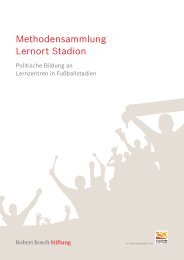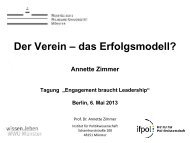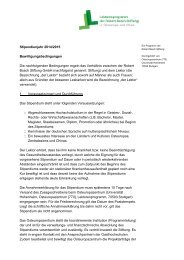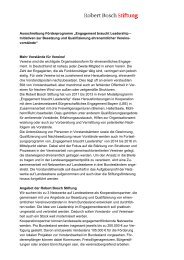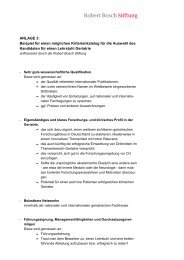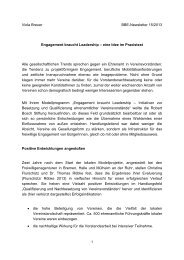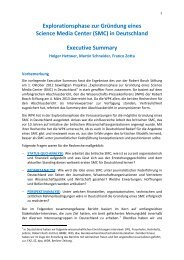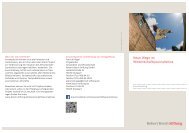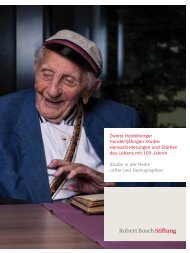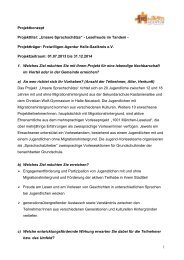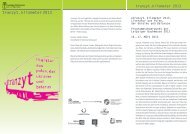Turkey, Its Neighbors and the West - Robert Bosch Stiftung
Turkey, Its Neighbors and the West - Robert Bosch Stiftung
Turkey, Its Neighbors and the West - Robert Bosch Stiftung
You also want an ePaper? Increase the reach of your titles
YUMPU automatically turns print PDFs into web optimized ePapers that Google loves.
What is at Stake? Key Questions <strong>and</strong> Policy Issues<br />
ask an american or european policymaker to name <strong>the</strong><br />
most challenging issues facing <strong>the</strong> transatlantic community<br />
today <strong>and</strong> you are likely to hear: stopping <strong>the</strong> proliferation<br />
of nuclear weapons; containing conflict in <strong>the</strong> Middle east;<br />
dealing with russia; ensuring a stable energy supply; <strong>and</strong><br />
defining <strong>the</strong> nature of <strong>the</strong> european union (eu) <strong>and</strong> its<br />
relationship with <strong>the</strong> united states. at <strong>the</strong> center of all<br />
of <strong>the</strong>se, in some cases literally, st<strong>and</strong>s <strong>Turkey</strong>.<br />
There once was a time when <strong>the</strong> united states <strong>and</strong> <strong>the</strong><br />
european union could take <strong>Turkey</strong> – a north atlantic Treaty<br />
organization (naTo) member since 1952 <strong>and</strong> a european<br />
union aspirant since 1963 – for granted. There was also a<br />
time when foreign policy was <strong>the</strong> exclusive domain of Turkish<br />
diplomats <strong>and</strong> <strong>the</strong> military, who ensured ankara’s participation<br />
in regional <strong>and</strong> global struggles that were defined, primarily,<br />
in europe <strong>and</strong> <strong>the</strong> u.s.. That time has passed.<br />
The recent activism <strong>and</strong> independence of Turkish foreign<br />
policy has caused political repercussions throughout europe,<br />
<strong>the</strong> united states, <strong>and</strong> in <strong>Turkey</strong>’s immediate neighborhood.<br />
In <strong>the</strong> <strong>West</strong>, <strong>the</strong>re are fears that <strong>Turkey</strong> is being “lost,”<br />
that it is becoming more oriented toward russia or <strong>the</strong><br />
Middle east, <strong>and</strong> that it is drifting away from secularism<br />
<strong>and</strong> toward Islamism. at <strong>the</strong> very least, <strong>Turkey</strong> is seen as a<br />
more autonomous actor pursuing greater regional <strong>and</strong> global<br />
influence, <strong>and</strong> a less reliable partner of <strong>the</strong> <strong>West</strong>. Indeed,<br />
Turkish foreign policy, particularly under <strong>the</strong> influence<br />
of current Minister of foreign affairs ahmet Davuto ˘glu,<br />
conceptualizes <strong>Turkey</strong> as a central country in <strong>the</strong> midst<br />
of afro-eurasia, one that attempts to pursue “strategic<br />
depth” <strong>and</strong> “zero problems” with its neighbors. It does so<br />
by fostering bilateral <strong>and</strong> multilateral ties, by using <strong>the</strong><br />
country’s ottoman heritage as a foreign policy asset, <strong>and</strong><br />
by exerting “soft power” in its region. actions in support of<br />
<strong>the</strong>se policy goals include <strong>Turkey</strong>’s engagement of states <strong>and</strong><br />
movements shunned by <strong>the</strong> <strong>West</strong>, such as Iran, syria, <strong>and</strong><br />
hamas. More broadly, by contributing to <strong>the</strong> integration of its<br />
immediate neighborhood into <strong>the</strong> global environment through<br />
trade <strong>and</strong> movement of people, <strong>Turkey</strong>’s democracy <strong>and</strong><br />
liberal market economy are having a a demonstrative spill<br />
over effect on its neighbors, however modest. at <strong>the</strong> global<br />
level, as a nonpermanent member of <strong>the</strong> united nations<br />
security Council, a G-20 founding member, <strong>and</strong> current<br />
C H A P T E R<br />
holder of <strong>the</strong> post of secretary General of <strong>the</strong> organization<br />
of <strong>the</strong> Islamic Conference (oIC), <strong>Turkey</strong> is in a position<br />
to make a difference in a way unprecedented in its<br />
republican history.<br />
What are <strong>the</strong> consequences of <strong>Turkey</strong>’s increased foreign<br />
policy activism <strong>and</strong> independence? <strong>Turkey</strong> has <strong>the</strong> economic<br />
<strong>and</strong> political potential to be a trans-regional actor that<br />
promotes regional peace, prosperity, <strong>and</strong> stability or an<br />
inward-focused regional state, whose domestic turbulence<br />
exacerbates problems abroad. Which course it follows<br />
depends on changes in <strong>Turkey</strong>’s neighborhood, <strong>and</strong> on <strong>the</strong><br />
outcome of critical domestic political struggles. Turkish<br />
democracy in fact is not consolidated. eu-driven reforms,<br />
such as greater freedom of expression, have changed <strong>the</strong><br />
political l<strong>and</strong>scape within <strong>Turkey</strong> dramatically over <strong>the</strong> last<br />
decade, but <strong>the</strong> transformation toward liberal democracy is<br />
far from complete. <strong>Turkey</strong>’s foreign policy course will also<br />
be shaped by <strong>the</strong> evolution of its relations with its long-time<br />
allies in <strong>the</strong> <strong>West</strong>: <strong>the</strong> european union <strong>and</strong> <strong>the</strong> united states.<br />
<strong>Turkey</strong>’s new regional activism has made it a potentially<br />
powerful force for peace <strong>and</strong> regional development. but to<br />
be successful, <strong>Turkey</strong>’s drive for “zero problems with its<br />
neighbors” requires active support from <strong>the</strong> eu <strong>and</strong> <strong>the</strong><br />
united states. It is time to move beyond <strong>the</strong> debate over<br />
“Who lost <strong>Turkey</strong>?” <strong>and</strong> <strong>the</strong> tendency to see <strong>Turkey</strong> as acting<br />
out a role in a play written elsewhere. It is now time to<br />
respond constructively to <strong>Turkey</strong>’s pursuit of its own foreign<br />
policy goals <strong>and</strong> orientation by recognizing how those goals<br />
may align with transatlantic policy objectives, even if <strong>the</strong>y<br />
come from a different perspective.<br />
To this end, this report addresses <strong>Turkey</strong>’s changing role<br />
in its immediate neighborhood, including <strong>the</strong> black sea<br />
region to <strong>Turkey</strong>’s north <strong>and</strong> <strong>the</strong> Middle east to its south,<br />
in a variety of policy areas. These topics include energy<br />
policy, conflict resolution, <strong>the</strong> promotion of democracy,<br />
trade <strong>and</strong> migration. It discusses <strong>the</strong> underlying causes<br />
of <strong>Turkey</strong>’s current foreign policy, including changes in<br />
its immediate neighborhood, as well as changes within<br />
<strong>Turkey</strong> itself.<br />
1<br />
7



